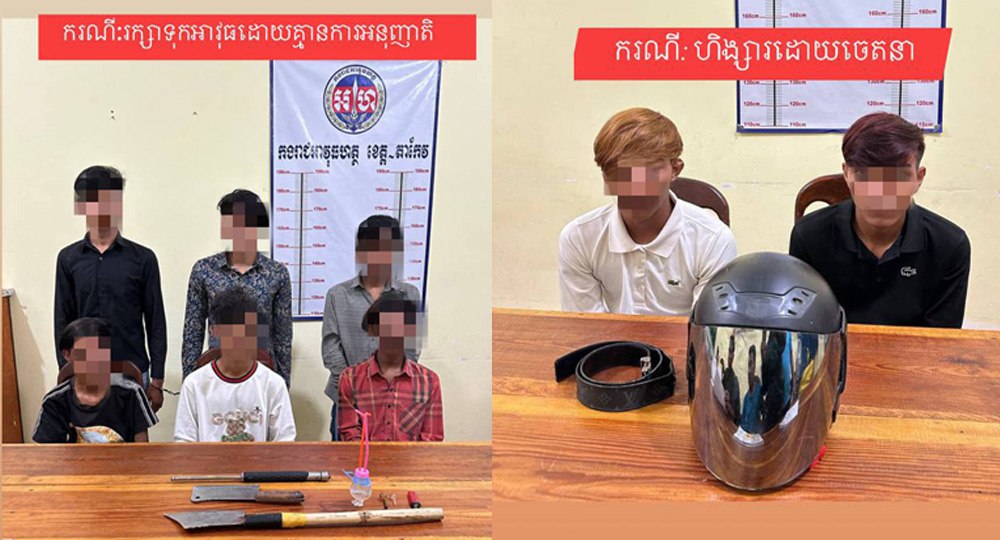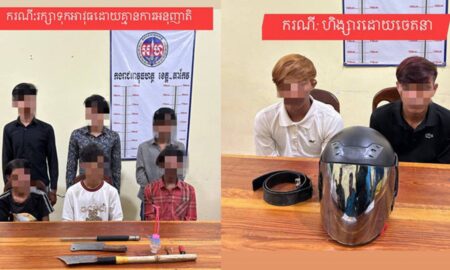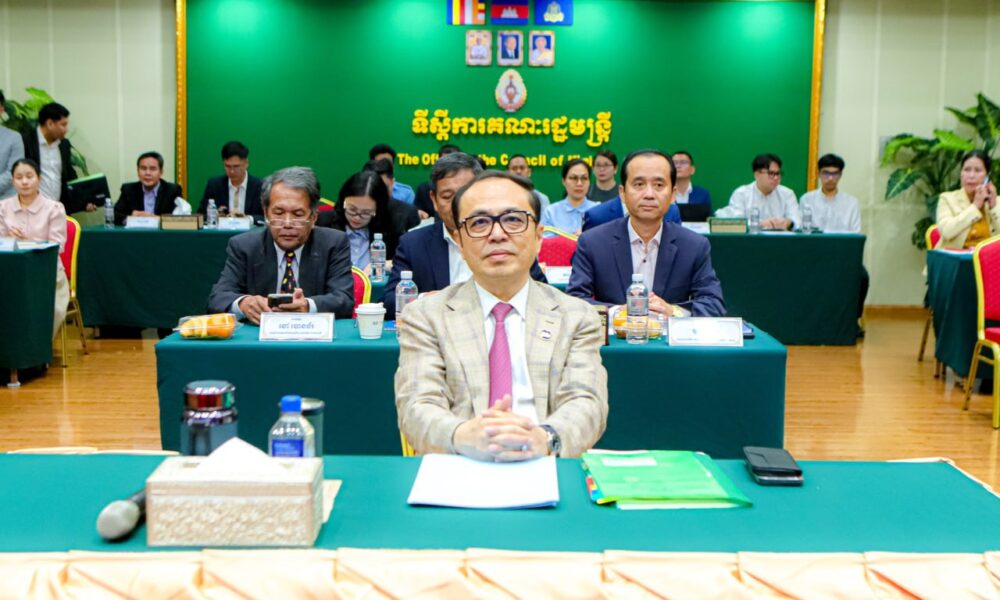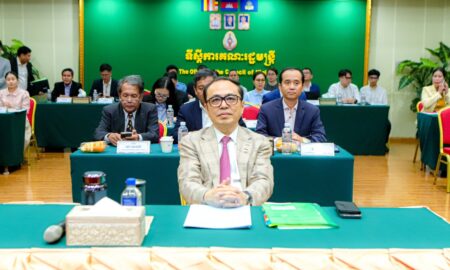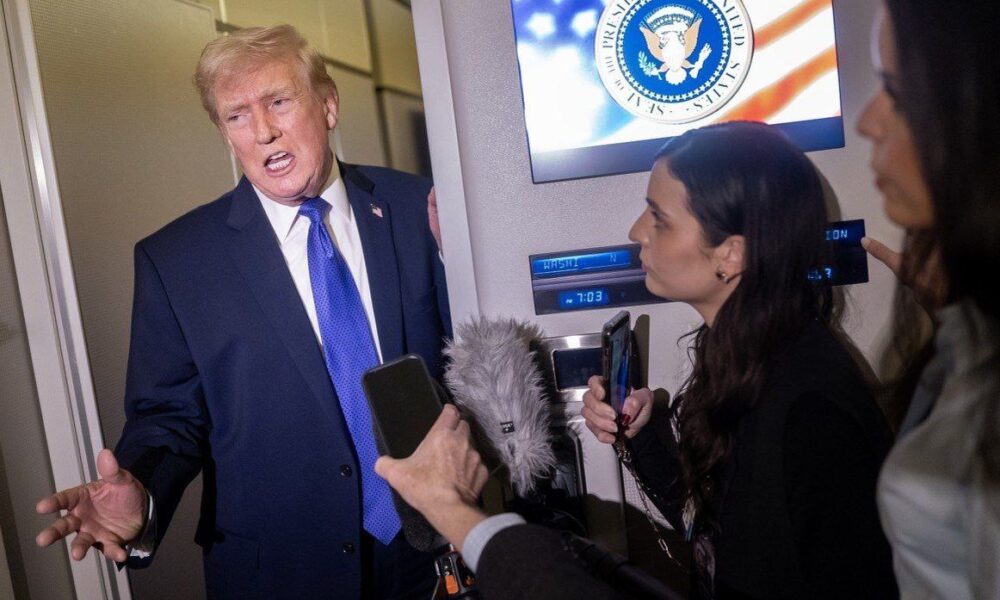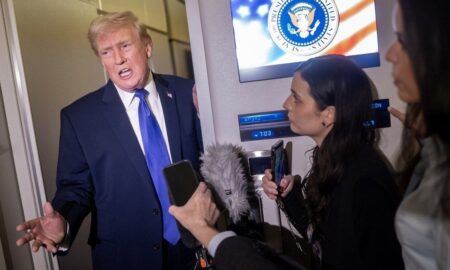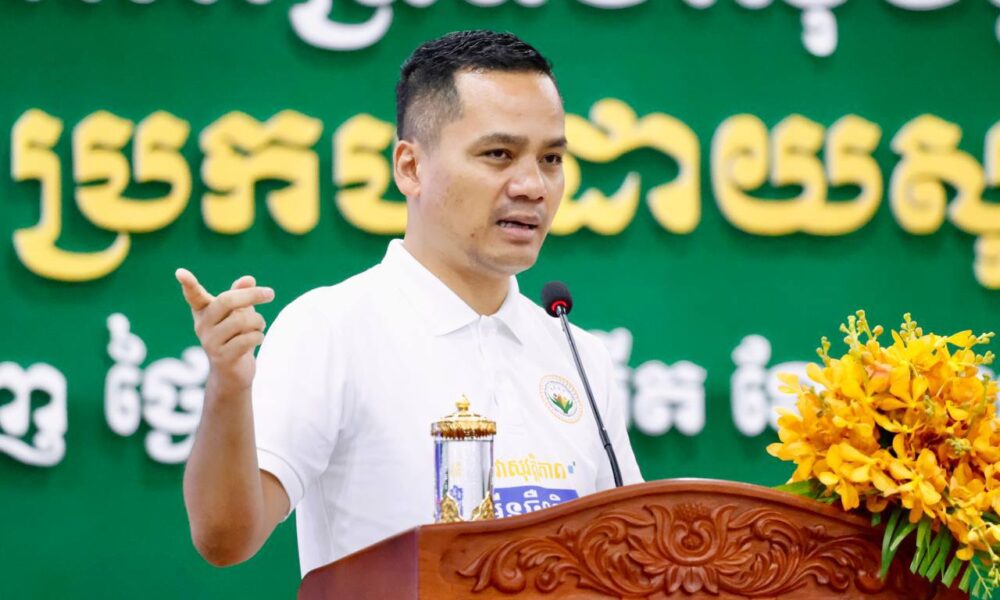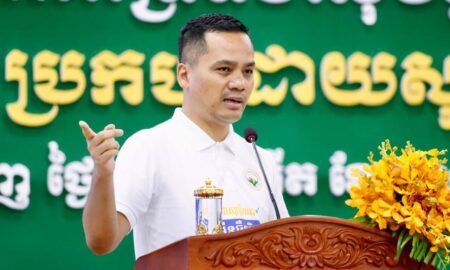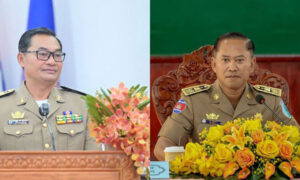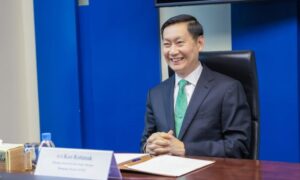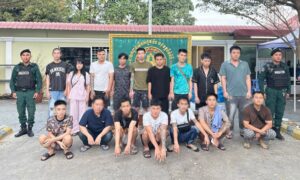Xi Jinping, general secretary of the CPC Central Committee, waves to journalists at the Great Hall of the People in Beijing, Oct. 23, 2022. (Xinhua/Pang Xinglei)
After 10 years at the helm of the Communist Party of China (CPC), Xi Jinping, 69, once again stood in front of reporters as the Party’s top leader, vowing to lead the country to pursue national rejuvenation through a Chinese path to modernization.
“We shall keep in mind the Party’s nature and purpose and our own mission and responsibility, and work diligently in the performance of our duty, to prove worthy of the great trust of the Party and our people,” Xi said Sunday, as he led his colleagues to meet the press, fresh from a Party plenum that elected him general secretary of the CPC Central Committee.
In 2012, after assuming the Party’s top job, Xi said that he and his colleagues would lead the CPC in striving for national rejuvenation, pursuing a better life for the people, and addressing problems within the Party.
In the past decade, China under his leadership has witnessed historic changes, with its economy more than doubling to 114 trillion yuan (16 trillion U.S. dollars), absolute poverty wiped out and moderate prosperity attained for the country’s 1.4 billion people.
It was also a decade of severe challenges. The COVID-19 pandemic, a trade war with the United States and the downward pressure on the economy all posed hurdles for China’s development and tested the strength of Xi and the Party he leads.
Bringing about milestone transformations and ushering in a “new era” for socialism with Chinese characteristics, Xi is regarded as the helmsman capable of leading the country in overcoming difficulties and pursuing full modernization.
Stephen Perry, chairman of Britain’s 48 Group Club, said everything he has seen in President Xi tells him that Xi’s motivation is the people of China, which is very important for China’s development at its current stage.
Robert Kuhn, an American scholar who authored the book “How China’s Leaders Think,” said Xi has an objective and comprehensive understanding of China’s current situation, as well as detailed and rational thinking of its future.
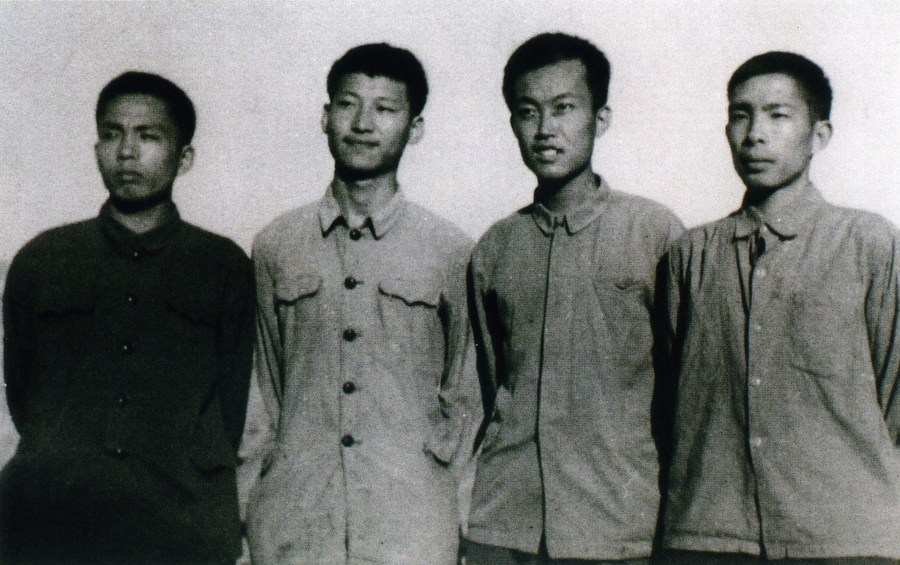
Xi Jinping (2nd L) poses for a photo in Yanchuan County of northwest China’s Shaanxi Province in 1973. (Xinhua)
SON OF LOESS PLATEAU
Xi Jinping was born in June 1953 into a revolutionary family. His father, Xi Zhongxun, was a revered CPC leader. Describing his father as “someone who had devoted himself wholeheartedly to the Chinese people,” Xi Jinping said he was greatly inspired by the elder Xi and had pledged to follow in his footsteps.
At 15, as an “educated youth,” Xi left Beijing for a village called Liangjiahe in an arid part of northwest China’s Shaanxi Province, carrying with him a small sewing bag embroidered with Chinese characters “mom’s heart” by his mother Qi Xin.
Xi would later spend seven years in the countryside, working and living alongside farmers. He called himself a farmer when he recalled his Liangjiahe years. He was separated from his family, slept in cave dwellings, suffered from flea bites, and worked as hard as fellow villagers to tend crops, herd sheep, carry manure and haul coal.
He joined the CPC there and later became the village Party chief — the beginning of his political career. Xi recalled his earnest wish then was “to make it possible for the villagers to have meat and have it often.” He led them to dig wells, build dams, terrace hills and set up the province’s first methane-generating pit.
This experience means a lot to Xi and he often talks about it, even after becoming the top leader. During a state visit to Costa Rica in 2013, he visited the home of a farming family and talked about his experience in the countryside.
“It is extremely rare for a president to speak so passionately and with such pride about being a farmer. Some people may downplay that aspect, but he does not; he emphasizes it,” said Alberto Zamora, whose family owns the coffee plantation Xi visited.
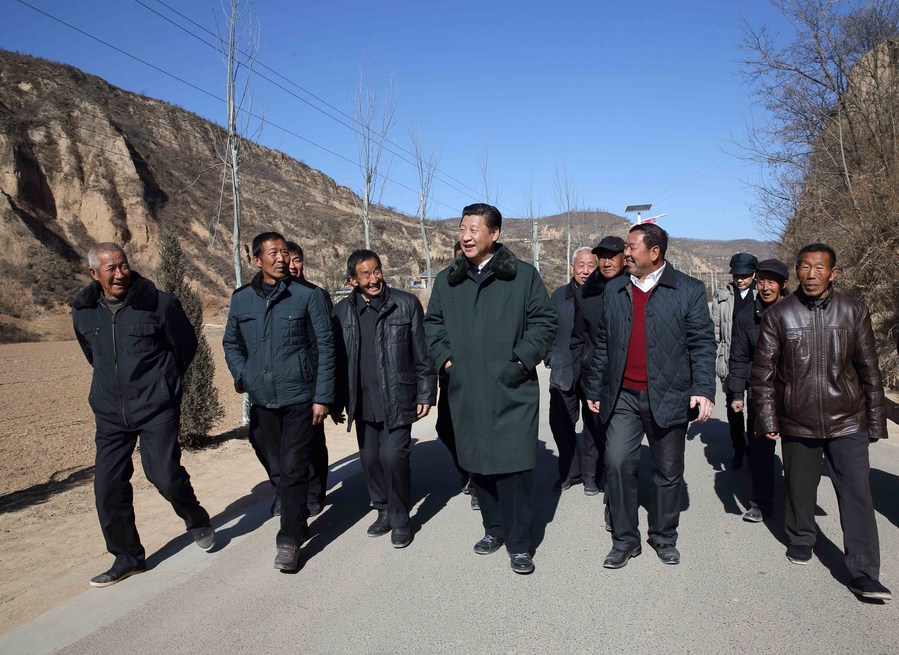
Xi Jinping visits Liangjiahe Village, northwest China’s Shaanxi Province, Feb. 13, 2015. (Xinhua/Lan Hongguang)
Xi said he gained his understanding of the meaning of the word “people” through his experience in Liangjiahe, and it strengthened his determination to “serve the people” — a principle he has adhered to over the decades.
In the late 1970s, after graduating from Tsinghua University, Xi served as a secretary to the minister of defense. In 1982, he volunteered to work at the grassroots level and moved to Zhengding, a poor county in north China’s Hebei Province. Peng Liyuan, his wife, later said that many of Xi’s classmates went abroad and he could have just done the same. But Xi stayed and chose a much harder path — to be a servant to the people.
In his three years in Zhengding, where Xi served as deputy Party chief and then Party chief, Xi rode bicycles to all the communes and production teams of the county to inspect work. Sometimes, he arrived when villagers were tilling the fields. He would join them and do the farm work.
Then he spent over 17 years in Fujian Province and nearly five years in Zhejiang Province. He served multiple roles in the two coastal provinces including vice mayor, prefecture Party chief, municipal Party chief, provincial governor, and provincial Party chief. In 2007, he worked in Shanghai as its Party chief before ascending to the Standing Committee of the Political Bureau of the CPC Central Committee.
Xi kept a close bond with the people wherever he worked, even after he was promoted to work at the apex of the Party. Xi has made it a tradition to visit the homes of the people ahead of every Spring Festival. Xi’s early-year experience of hunger and toiling on the farms may help explain why he would check the kitchen, bathroom and cellar in ordinary people’s homes. He also kept the habit of exchanging correspondence with the people. Those who received Xi’s letters include farmers, entrepreneurs, pupils, grassland art troupe members, and soldiers guarding the borders.
In 2013, Xi initiated a “targeted poverty alleviation” drive and made plans for its implementation. Altogether, over 255,000 work teams and more than 3 million cadres were sent to the countryside to help villagers shake off poverty household by household. About 100 million people were lifted out of extreme poverty in the past decade.
Being with the people through thick and thin has strengthened his conviction: to strive for happiness for the people and rejuvenation for the nation. In the past decade, Xi initiated five Party-wide education campaigns to remind CPC members of their original aspiration and the Party’s founding mission.
Xi is very familiar with the plight of the nation after the Opium Wars brought by Western colonialists in the 19th century. In 2018, he visited the ruins of a cannon fort on Liugong Island in east China’s Shandong Province. More than a century ago, the island bore witness to the crushing defeat of China’s first modern navy in the First Sino-Japanese War. Xi paused for thought at the ruins, and inside the museum for the war he read out a patriotic poem deploring the foreign invasion at the time.
As the first CPC chief born after the founding of the People’s Republic of China in 1949, Xi shared pride in a string of achievements that manifested “the Chinese people have stood up”: the victory in the War to Resist U.S. Aggression and Aid Korea, the establishment of a relatively complete industrial system, and the manufacture of nuclear bombs and satellites. He commended the achievements. “Only socialism could save China; only socialism could develop China,” he said.
After the reform and opening up was launched, Xi had great passion and devoted himself to the cause. From relatively poor inland regions to the country’s affluent eastern coast, Xi took the lead in boosting foreign trade and investment, as well as the common development of both public and private businesses. As the Party’s top leader, Xi convened a high-profile meeting of private businesses. He said private businesses and entrepreneurs are “our own people.” He also said China’s private sector can only be strengthened, not weakened.
Xi is regarded by his comrades, both at local and central levels, as being good at long-term planning.
In 2020, his strategic planning was manifested in mapping out the country’s 14th Five-Year Plan and long-term objectives through 2035. To make a good plan, Xi chaired meetings to listen to the views and opinions of experts, business people, scientists and grassroots cadres. He instructed carrying out online suggestion collection. Chinese internet users gave over 1 million comments.
In the past decade, Chinese people’s wealth grew steadily. In 2021, the per capita disposable income of the Chinese reached 35,128 yuan, growing nearly 80 percent from 2012. The urban-rural income ratio was narrowed to 2.5:1.
In Xi’s words, all he did is essentially for the betterment of the people. He once penned a memoir in which he wrote, “We must love the people like we love our parents, work for their well-being and enable them to lead a better life.” After becoming the general secretary, he said, “the people’s aspiration for a better life is what we are striving for.”
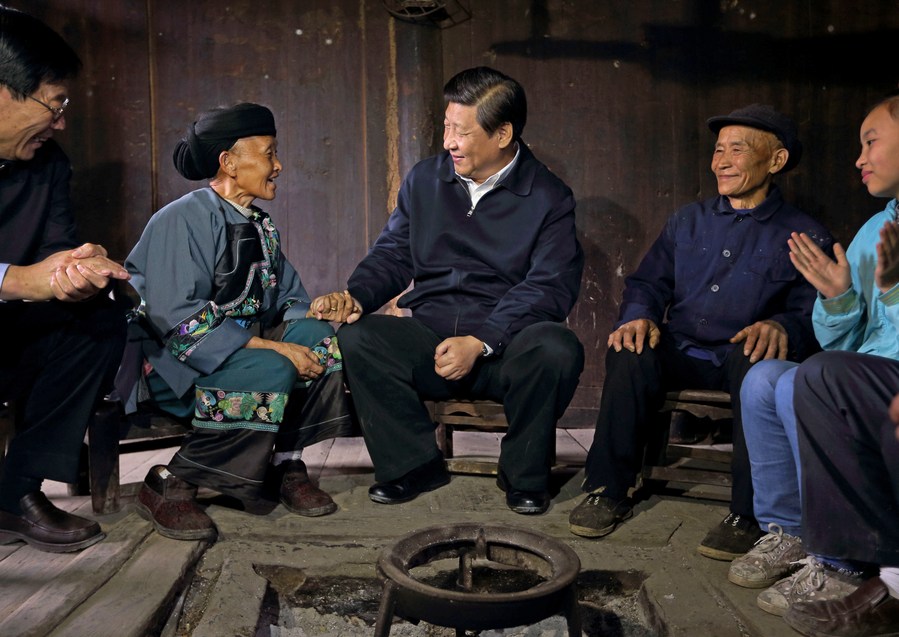
Xi Jinping talks with villagers in Shibadong Village in central China’s Hunan Province, Nov. 3, 2013. (Xinhua/Lan Hongguang)
Meeting the press on Sunday after the first plenary session of the 20th CPC Central Committee, Xi said the people will “always have our back and give us confidence,” and the Party will always ride out the storm with the people and stay heart-to-heart with them.
The Party and the government enjoy good ratings. A Harvard University survey found that Chinese citizens’ satisfaction with the government has increased across the board, with the central authorities receiving the highest level of approval at 93 percent. An Edelman poll also found that trust among Chinese citizens in their government reached 91 percent in 2021, the highest around the globe.
FOR A STRONG CHINA
Xi inherited a mission to achieve China’s modernity, which had been dreamed of and fought for by generations of Chinese people.
In 2020, he paused before an exhibit at a museum in Guangdong Province displaying a grand plan Sun Yat-sen designed to modernize China a century ago. Sun successfully led the Revolution of 1911 to end China’s last imperial dynasty and founded a republic. But it did not last. The grand plan failed to materialize. “Only we Chinese Communists can make it happen,” Xi said before the exhibit.
According to Xi, all the endeavors the Party led the nation in pursuing over the century are to turn China into a great modern country and realize the Chinese Dream of national rejuvenation.
Ten years ago, when Xi ascended to the Party’s top post, China was already the world’s second-largest economy and top manufacturer. But the economy faced increasing downward pressure and the need for transforming the economic structure was pressing. Other tough issues also needed to be resolved, such as corruption, pollution and the rich-poor income gap, all posing grave challenges to the Party.
All eyes were on Xi. People expected him to bring real changes. And changes must begin from the Party itself. Xi said it takes a good blacksmith to forge good steel, calling for the self-reform of the Party and “full and rigorous” self-governance. He unleashed the largest anti-corruption campaign in the Party’s history. “We must do the things that need to be done … If we let a few hundred corrupt officials slip through the cracks, we would let down all 1.3 billion Chinese people,” Xi said.
In the past decade, the fallen crooked officials included the “tigers” such as Zhou Yongkang, Bo Xilai, Guo Boxiong, Xu Caihou, Sun Zhengcai, and Ling Jihua, as well as many top officials of central government departments, state-owned companies, and provinces. There were also numerous cadres in much lower positions in the governance hierarchy.
In early 2022, Xi declared that an overwhelming victory had been achieved in the fight against corruption, and the victory has been consolidated across the board. But he warned Party cadres that they must be sober-minded and be aware that the anti-corruption campaign will never end.
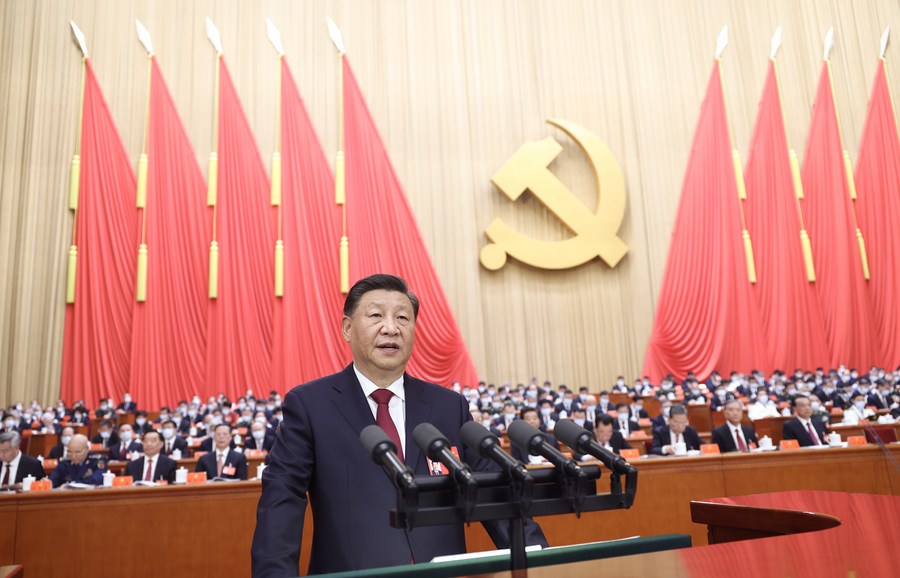
Xi Jinping delivers a report to the 20th CPC National Congress on behalf of the 19th CPC Central Committee at the Great Hall of the People in Beijing, Oct. 16, 2022. (Xinhua/Ju Peng)
Xi wants to ensure that the CPC’s over 96 million members and 4.9 million primary-level organizations maintain their purity and strength. Xi considers the Party’s overall leadership the key to building China into a great modern socialist country. The Party must “be the strong backbone that the Chinese people can lean on at all times,” he said.
He repeatedly told Party cadres to learn from the collapse of the Soviet Union and reiterated the importance of having firm convictions in communism and strengthening Party discipline. Xi led the formulation of the game-changing eight-point decision on improving work conduct. He ordered leading officials to regularly report their personal and family matters such as marriage status, personal finances and business involvement. The Party regulated the business involvement of the spouses, children and children’s spouses of over 4,700 officials between 2015 and 2021.
Xi led the efforts to promulgate and revise a series of Party regulations, improve the mechanism to conduct discipline inspections, and establish the National Commission of Supervision that places everyone in public office under oversight.
Observers said Xi has played a key role in reshaping the CPC. Liu Jingbei, a professor at the China Executive Leadership Academy in Pudong, said Xi further strengthened the unity in thinking, political orientation and action of Party members. He reversed the trend that the Party’s leadership was being weakened and marginalized in some localities and departments.
Xi called on the public to respect and learn from heroes. A national law on respecting heroes was promulgated. A sound system of granting awards and honors was set up. Xi also put forward a set of core socialist values, the essence of which, he said, is patriotism.
Xi has fostered the concept of “whole-process people’s democracy,” calling for greater efforts to develop socialist democracy. He said democracy is an instrument for addressing the issues that concern the people. If the people are only awakened at election time but go into hibernation afterward, then this kind of democracy is a mere formality.
The law-based governance in all fields Xi advances is considered a profound revolution in governance. The rule of law for the country, the government, and society must be comprehensively in place by 2035, according to Xi. He is the first Chinese president to swear allegiance before the country’s Constitution. Xi said the Constitution enjoys supreme legal status, authority and force.
In the past decade, China’s national legislature adopted 70 laws and revised 238 laws. Many of the legislations are groundbreaking, including the Civil Code adopted in 2020 and the Foreign Investment Law adopted in 2019, which is the basic law governing foreign direct investment in the country promoting the high-level liberalization and facilitation of foreign investment.
These efforts have helped create more favorable conditions for development. Xi raised the notion of economic “new normal.” He said China’s reform has entered deep water.
He personally chairs a number of central commissions to strengthen the Party’s leadership over economic work as well as reform and opening up. He led the efforts to streamline government and reduce taxes and fees for enterprises.
Since the third plenum of the 18th CPC Central Committee in 2013, more than 2,000 reform plans have been implemented, covering almost every aspect of economic, political, social and cultural undertakings as well as people’s everyday life.
Xi has put forward a new development philosophy that promotes innovative, coordinated, green, open and inclusive development for all. Peter Koenig, a former senior economist at the World Bank, said the new development philosophy is probably the core of what has been named “Xiconomics.” “This is very typical and I think it well describes what is happening now in the Chinese economy,” he said.
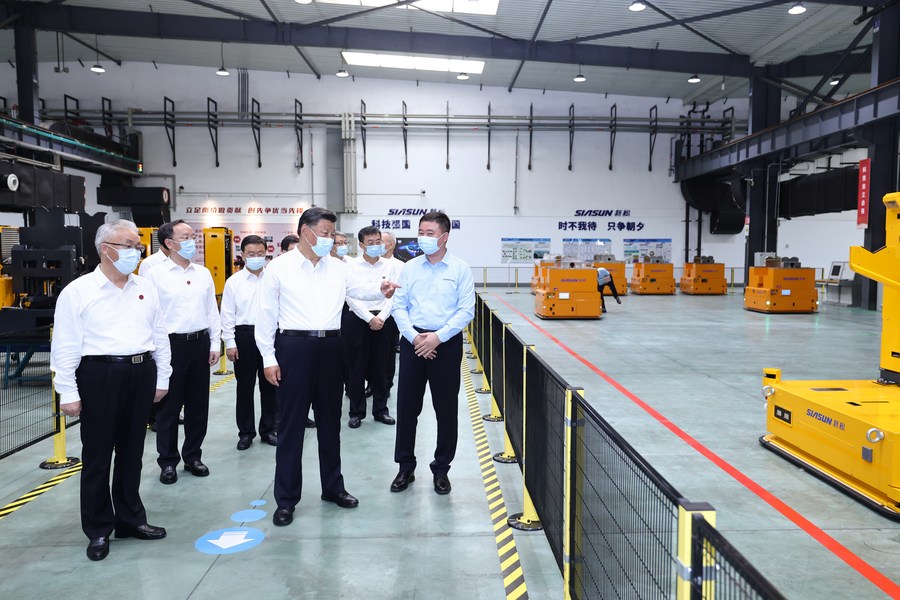
Xi Jinping visits a workshop of the Siasun Robot and Automation Co., Ltd. in Shenyang, northeast China’s Liaoning Province, Aug. 17, 2022. (Xinhua/Ju Peng)
Xi often went to companies, factories, shops and stalls to feel the pulse of economic activity. On a visit to a carmaker workshop, he got into a China-made sedan for first-hand experience. If China wants to upgrade from a big car-manufacturing country to a strong one, it needs to develop new-energy cars, he said, calling for making the NEV sector a new growth point.
But it was not just big companies that command Xi’s attention. He also discussed with villagers the sales of their ham and liquor, walked into community workshops, visited livestreaming platforms, and dropped by roadside food stalls.
Under his leadership, China has consolidated its position as the world’s second-largest economy. In the past decade, the share of China’s GDP in the global economy grew from 11.3 percent to 18.5 percent. On average, the Chinese economy contributed more than 30 percent of global economic growth in recent years. It was the first major economy to register growth after the COVID-19 pandemic wreaked havoc around the world.
In 2021, China’s foreign trade exceeded 6 trillion U.S. dollars. Its trade with the United States grew by nearly 30 percent and amounted to 755.6 billion dollars. According to a 2022 survey by the American Chamber of Commerce in China, 66 percent of the respondents said their companies plan to increase investment in China this year. China remains among the top three global investment destinations for about 60 percent of the member companies.
Stressing a people-centered approach to development, Xi rolled out a slew of policies that bring tangible benefits to the people. China has established the world’s largest social security system, with 1.04 billion people covered by basic old-age insurance and 95 percent of the population covered by basic medical insurance. Fiscal spending on education accounted for over 4 percent of GDP for 10 years in a row. China has also introduced the three-child policy, and rolled out measures to reduce homework and after-school tutoring burdens on students.
Xi has placed common prosperity on agenda. He said this is the essential requirement of socialism. Xi’s common prosperity drive aims to narrow the rich-poor gap, address the regional and industrial disparity, and improve both the material and cultural-ethical life of the people, thus achieving balanced development and social equality. Zhejiang, where Xi once served as provincial Party chief, is designated as a pilot zone for advancing common prosperity. Statements on “gradually realizing the goal of common prosperity for all” were enshrined in the Party Constitution at the just-concluded 20th CPC National Congress.
In the past decade, China witnessed holistic and historic improvements in environmental protection. Xi declared at a virtual UN gathering that China will strive to peak carbon dioxide emissions before 2030 and achieve carbon neutrality before 2060. He instructed imposing a 10-year fishing ban in the Yangtze River. Every river in China now also has a river chief, in charge of its ecological protection. Endangered species such as giant pandas, Tibetan antelopes and snow leopards have been brought back from the brink of extinction thanks to improved conservation efforts.
For some time, air pollution was bad in Beijing. Xi once said the first thing he did in the morning was to check Beijing’s air quality. He led the nation to engage in an unprecedented fight against pollution, notably air, water and soil pollution. Years of tenacious efforts paid off. Air quality has significantly improved in Beijing, as elsewhere across the country. A report by the University of Chicago’s Energy Policy Institute said the density of harmful particulates in the air in China fell 40 percent between 2013 and 2020. If sustained, this would add about two years to the average life expectancy of Chinese citizens, it said.
Xi places sci-tech innovation at the core of overall national development and issued the call to build greater scientific and technological strength.
He chaired group study sessions of the Party leadership and invited experts to brief him and his colleagues on artificial intelligence, big data, quantum technology and blockchains. He visited satellite launching sites, chip labs and high-speed train workshops to learn the latest sci-tech development. “You can’t ask, buy, or beg for core technologies in key fields from other countries. They must be kept firmly in our own hands,” Xi said.
China’s ranking in the Global Innovation Index, released by the World Intellectual Property Organization, rose from 34th place in 2012 to 11th place in 2022. Between 2012 and 2021, China’s research and development spending increased from 1 trillion yuan to 2.8 trillion yuan. It now ranks second in the world.
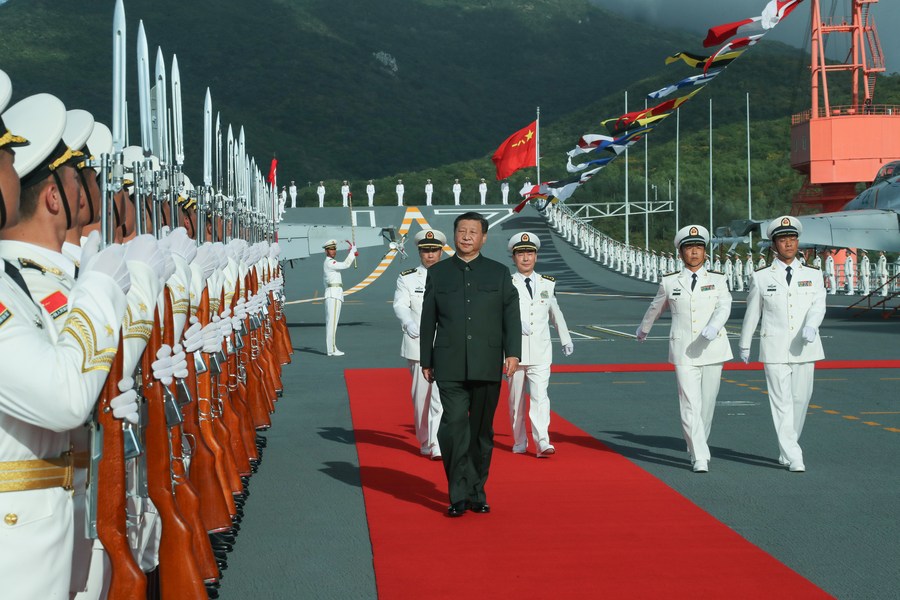
Xi Jinping boards the aircraft carrier Shandong and reviews the guard of honor at a naval port in Sanya, south China’s Hainan Province, Dec. 17, 2019. (Xinhua/Li Gang)
Xi has close ties with the military and knows its operations well. He initiated the earth-shattering military reform, in a bid to build the People’s Liberation Army (PLA) into world-class armed forces.
Xi reiterated the principle that the Party commands the gun. A number of high-ranking military officers were punished for violating Party discipline and the law. Xi improved the system of the Central Military Commission (CMC) chairman assuming overall responsibility. A new military structure has been established with the CMC exercising overall leadership, the theater commands responsible for military operations, and the services focusing on developing capabilities.
The PLA was steered to focus on strengthening its combat capability. It has also improved command systems and capacity for joint operations, working hard to address “peacetime ills.”
As the top commander, Xi reviewed armed forces at grand parades five times, two of which were organized in the sea. Over the past decade, China unveiled two homegrown aircraft carriers. The fifth-generation stealth fighter aircraft, J-20, was commissioned. China also took the lead in hypersonic weapon research. The Chinese military today has the determination and ability to safeguard China’s sovereignty, unification and territorial integrity, to provide strategic support for national rejuvenation, and to make even greater contributions to world peace and development, according to Xi.
Media outlets described Xi as the leader who is making China strong. They said he has solved a great number of problems that had long gone unsolved and secured many accomplishments of major significance for the future. Xi’s contributions are ground-breaking and unique, exerting a global influence, they said.
In October 2017, Xi Jinping Thought on Socialism with Chinese Characteristics for a New Era was officially instituted at the 19th CPC National Congress as a guiding principle. The thought was enshrined in the CPC Constitution and China’s Constitution.
David Ferguson, who edited the English translation of four volumes of “Xi Jinping: The Governance of China,” said poverty alleviation, the Belt and Road, and the environmental cleanup all fit in Xi’s thought and they fit at the grassroots level where ideas become action, driving the historic changes over the past decade.
In 2016, Xi’s core position on the Party Central Committee and in the whole Party was established at the sixth plenum of the 18th CPC Central Committee.
“To me, this means responsibility,” Xi said, pledging to devote all his time and energy to the job so that he can live up to the trust the Party and the people place in him.
In 2021, the Party’s third historical resolution says Xi’s core position and the guiding role of Xi’s thought are of decisive significance for driving forward the historic process of national rejuvenation.
A resolution adopted at the 20th CPC National Congress says that the establishment of Xi’s core position and the guiding role of Xi’s thought has enabled the Party to successfully resolve the acute problems and challenges undermining its long-term governance, the security and stability of the country, and the well-being of the people, to remove serious hidden dangers in the Party, the country and the military, and to ultimately set the rejuvenation of the Chinese nation on an irreversible historical course.
Theorists said Xi has provided answers to the questions of China, of the world, of the people and of the times. He has further drawn the blueprint for China’s development, and his thought is considered a new breakthrough in adapting Marxism to the Chinese context and the needs of the times.
Volker Tschapke, honorary president of the Prussian Society in Germany, said Xi’s thought is “fascinating.” Xi is leading China toward modernity, which is very different from the Western model, Tschapke said, adding that people may one day realize that China’s path would take humanity to a better future.
A TOUGH MAN WITH A TENDER HEART
Xi has a strong track record as a crisis manager. Battle-hardened by years of handling tough situations, Xi has the experience, courage and tenacity needed to cope with the tests and challenges China faces today.
While working in the coastal regions of Fujian, Zhejiang and Shanghai, Xi led local response efforts to multiple powerful typhoons. During these instances, he would spend whole nights overseeing the evacuation in an effort to minimize casualties and damage.
When he served as vice president of China, Xi oversaw the preparations for Beijing 2008 Olympics and Paralympics, which were made under tremendous pressure in a year overshadowed by the devastating Wenchuan earthquake and the riots in Lhasa. Yet Beijing 2008 has been remembered as one of the best Games in history. Nearly 14 years later, under Xi’s leadership, China presented the world a streamlined, safe and splendid Winter Games despite COVID-19 and the so-called “diplomatic boycott” by some Western countries.
He says that China in the new era is faced with more challenges and uncertainties. “We must be prepared to carry out a great struggle with many new historical features.” While overseeing the drafting of the report to the 18th CPC National Congress, Xi demanded the statement be included.
“Achieving national rejuvenation is no easy task. It will take more than drum beating and gong clanging to get there. Realizing this great dream demands a great struggle. The tests we face on the way forward will only become more complex as we press on, and we must be prepared to crest unimaginable waves,” Xi told officials.
In 2015, when Yemen descended into chaos, Xi directed the PLA Navy to evacuate hundreds of stranded Chinese nationals. This inspired “Operation Red Sea,” a box office hit that ignited patriotic fervor. Also in 2015, Xi led a series of rescue efforts to address China’s stock market fluctuations, avoiding systemic risks.
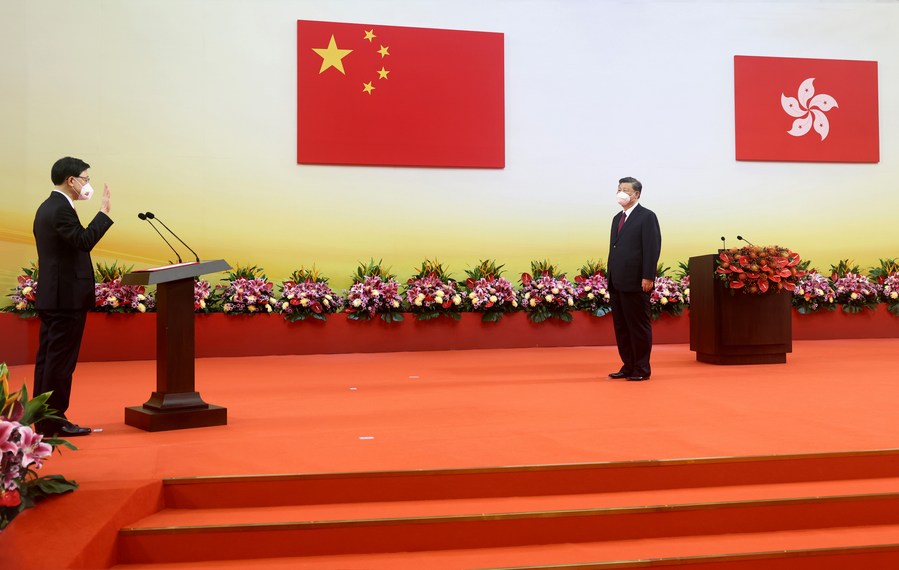
Xi Jinping administers oath of office to the sixth-term Chief Executive of the Hong Kong Special Administrative Region John Lee at the Hong Kong Convention and Exhibition Center, south China’s Hong Kong, July 1, 2022. (Xinhua/Ju Peng)
In response to severe situations in Hong Kong, Xi rolled out a package of measures, including the enforcement of the Hong Kong National Security Law and the improvements to the electoral system of the Hong Kong Special Administrative Region, to ensure that the central government exercises overall jurisdiction over Hong Kong and the city is administered by patriots. Order has been restored in Hong Kong. Xi said there is no reason to change such a good policy as “one country, two systems,” and stressed adhering to it in the long run.
Xi met with Ma Ying-jeou in Singapore in 2015, marking the first meeting between the leaders of the two sides of the Taiwan Strait since 1949. The cross-Strait relations deteriorated after the Democratic Progressive Party came to power in Taiwan in 2016. Xi has proposed a series of measures, including a “two systems” solution to the Taiwan question, to “maintain the initiative and the ability to steer in cross-Strait relations.” “We will continue to strive for peaceful reunification with the greatest sincerity and the utmost effort, but we will never promise to renounce the use of force, and we reserve the option of taking all measures necessary,” he said.
In August 2022, in disregard of China’s stern warning, U.S. House Speaker Nancy Pelosi went ahead with her visit to Taiwan, causing escalating tensions across the Taiwan Strait. The PLA conducted joint combat training exercises of an unprecedented scale around the Taiwan Island, effectively deterring “Taiwan independence” separatist forces and foreign interference. The one-China principle has become a more prevailing international consensus.
Xi often stays up late working. He has openly revealed one occasion on which he had a sleepless night.
On the eve of the Lunar New Year 2020, with COVID-19 clouding festivities, Xi had a sleepless night. The next day, he convened a Party leadership meeting to discuss the country’s response. Before the meeting, Xi had made a critical decision to tighten restrictions on the movement of people and channels of exit in central China’s Hubei Province and its capital city Wuhan.
On March 10, 2020, Xi visited Wuhan to inspect COVID-19 prevention and control on the front line. At a hospital specially built for treating COVID-19 patients, he spoke to a patient via video link, voicing his encouragement.
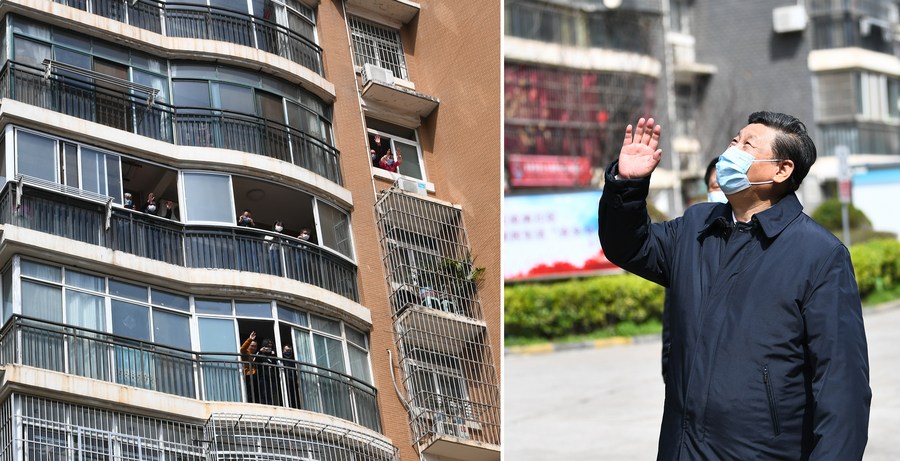
This combo photo shows Xi Jinping waving to residents who are quarantined at home and sending regards to them at a community in Wuhan, central China’s Hubei Province, March 10, 2020. (Xinhua/Xie Huanchi)
Xi has likened China’s COVID-19 fight to a war. Under his leadership, China has led the world in getting COVID-19 under control and restarting work and production. After the severe outbreak in Wuhan and Hubei was brought under control, Xi has led China in implementing a dynamic zero-COVID policy, maintaining the country’s COVID-19 infection and fatality rates at a very low level.
Given its huge population, if China adopted such prevention and control policies as herd immunity or a hands-off approach, the consequences would be unimaginable, Xi said.
“We would rather suffer temporary losses in economic development than harm people’s lives and health, particularly the elderly and children. Judged from the effects in all aspects, our COVID-19 response measures are the most economical and effective,” he said.
Handling China-U.S. relations was one of Xi’s priorities in the past decade. When the United States initiated a trade war against China, he devised the strategy that China does not want a trade war but is not afraid of one and will fight one if necessary.
In his meetings with former U.S. President Donald Trump and incumbent U.S. President Joe Biden, Xi said that China and the United States should not fall into a so-called trap of conflict and confrontation, and cooperation is the best option; and that the two countries should respect each other, coexist in peace, and pursue win-win cooperation. He also urged the U.S. side to respect China’s core interests and act prudently.
Faced with external suppression, China must, Xi said, “stay committed to running its own affairs well.” Under his leadership, China has steadily promoted reform and opening up, taken reciprocal countermeasures, and promoted multilateralism and economic globalization on the international stage.
During a visit to Italy in 2019, asked about how he felt about being Chinese president, Xi told Roberto Fico, then the president of the Italian Chamber of Deputies, that governing such a huge country requires a strong sense of responsibility and hard work.
“I am willing to be selfless and devote myself to China’s development,” Xi said. “I will not let the people down.”
A tough man in the face of challenges and crises, Xi also has a tender side. He wrote letters replying to American people, including young students. He hoped that the students would become young ambassadors for the friendship between the Chinese and American peoples.
Xi is open to diverse opinions and even criticism. During his tenure as a county Party chief, he received a letter from a young man who criticized the county’s work in boosting the production of commercial goods. Without being offended by the criticism, Xi acknowledged the young man’s talent and decided to send people to interview him for a potential job. As the Party’s top official, Xi also stressed that criticism and objections are allowed in intra-Party discussions and the decision-making process.
He likes making friends with intellectuals, writers and artists. When he was a county official in Hebei, he enjoyed many inspirational discussions with the writer Jia Dashan. Sometimes, the two would meet in Xi’s office and talk well into the night, only to find themselves locked in the compound. He has described intellectuals as “precious assets of the country,” exchanged letters with professors and artists, and interacted with intellectuals during visits to universities.
Xi is an avid sports fan. He enjoys football, ice hockey, boxing and swimming, often taking time out of his busy schedule to swim. He uses sports to learn how to deal with challenges. “What makes sports competitions fascinating, especially football matches, is their unpredictability,” Xi said. Just as athletes focus on cooperation during great football matches, we should focus more on cooperation than on individual skill, Xi once told cadres who were in charge of economic work.
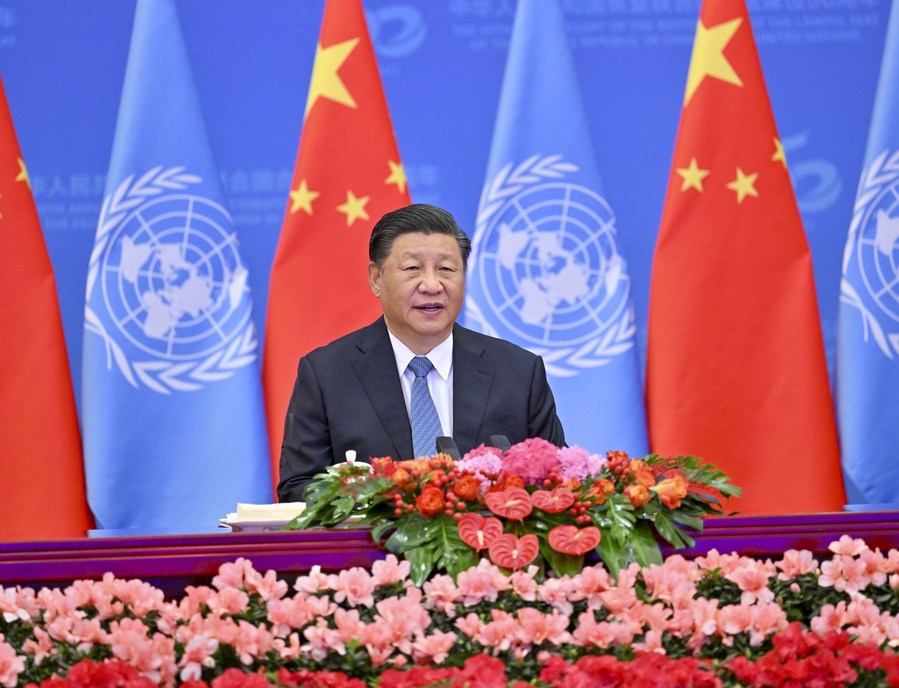
Xi Jinping delivers an important speech at a commemorative meeting marking the 50th anniversary of the restoration of the People’s Republic of China’s lawful seat in the United Nations, in Beijing, Oct. 25, 2021. (Xinhua/Li Xueren)
STRIVING FOR A BETTER WORLD
As a young man, Xi was already fascinated by the rich diversity of the world. In rural Shaanxi, he devoured literary classics of the world, such as Faust and William Shakespeare’s plays. He read Das Kapital three times; his reflections on the book filled 18 notebooks. “Marxism, though wide-ranging and profound, can be summed up in a sentence — the pursuit of the emancipation of humankind,” he later observed.
All the early reflections on the world and mankind have contributed to “a community with a shared future for humanity,” a vision Xi raised in 2013.
“Mankind, by living in the same global village in the same era where history and reality meet, has increasingly emerged as a community of common destiny in which everyone has in himself a little bit of others,” Xi said.
Xi appreciates the diversity of civilization. “There will be no human civilization without diversity,” he said.
The CPC keeps in mind the future of humanity, and it should contribute to human progress and world harmony, Xi said.
In 1979, Xi traveled to the Nordic countries as part of the entourage of a vice premier. In Norway, he was quite impressed by the social welfare system.
In 1985, Xi, then a county-level official, traveled as part of a Chinese delegation to the United States on an agricultural research trip. He was accommodated in a homestay in rural Iowa, sleeping in the bedroom of his host family’s son, who was at college at the time. The room was decorated with novelties such as “Star Trek” action figures.
Recalling this trip to the United States nearly three decades later, Xi said the Chinese and American peoples have many things in common, and can become good friends and partners for mutually beneficial cooperation.
Xi has visited the United States eight times. He was the first Chinese leader to watch an NBA game in a U.S. arena. When visiting Cuba, he paid a special visit to the breakwater in Cojimar where Hemingway wrote “The Old Man and the Sea,” and dropped by the bar Hemingway frequented to order a mojito. He said he wanted to feel for himself what was on the American writer’s mind and what the place was like when he wrote those stories.
Xi and Russian President Vladimir Putin have had approximately 40 meetings since 2013, charting the course of bilateral ties. China and Russia have forged a comprehensive strategic partnership of coordination for a new era. Bilateral trade has increased from 88.1 billion U.S. dollars in 2012 to 146.8 billion U.S. dollars in 2021. The two countries have cooperated on major energy projects such as the eastern route of the China-Russia natural gas pipeline. They have also launched cooperation in such frontier fields as the International Lunar Research Station project.
Xi advocates for the creation of a new model for relations between major countries. Transcending the outdated notions of confrontation and alliance, China has been building a network of global partnerships. “One cannot live in the 21st century with outdated thinking from the age of the Cold War and zero-sum games,” Xi said.
China has more neighbors than any other country in the world, and Xi has visited almost all of these neighboring countries. He has stressed the principles of amity, sincerity, mutual benefit and inclusiveness in forging friendships with China’s neighbors. He calls for more win-win cooperation to ensure that China’s development will bring even greater benefits to its neighbors.
Xi cherishes China’s friendships with other developing countries. At meetings with African leaders, he has announced a series of initiatives for pragmatic cooperation. Xi has urged BRICS countries and other emerging economies to pursue openness and innovation. A BRICS Partnership on New Industrial Revolution innovation center has been established in Xiamen, Fujian Province.
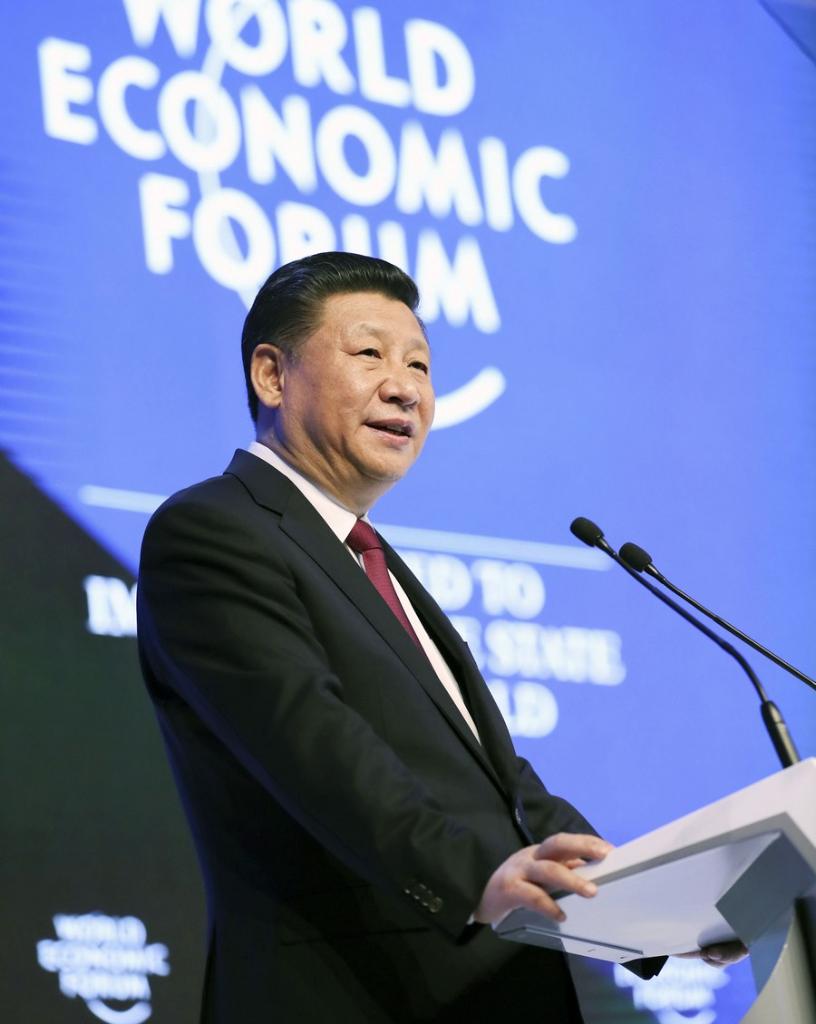
Xi Jinping delivers a keynote speech at the opening plenary of the 2017 annual meeting of the World Economic Forum in Davos, Switzerland, Jan. 17, 2017. (Xinhua/Lan Hongguang)
The vision of building a community with a shared future for humanity, which proposes building an open, inclusive, clean and beautiful world that enjoys lasting peace, universal security, and common prosperity, was enshrined in the Party’s Constitution and the country’s Constitution, and was incorporated into important documents of the United Nations and other international organizations or multilateral mechanisms.
Xi’s vision of building a community with a shared future for humanity is “the only future for humanity on this planet,” said Peter Thomson, president of the 71st Session of the UN General Assembly.
Xi likes to use analogies to illustrate the relationship between China and the world. Xi said China is a “peaceful, amiable and civilized lion,” and a “big guy,” but not “Mephisto.” “All countries are welcome to get on board the express train of China’s development.”
According to Xi, China is always a builder of world peace. “Only when we all cherish and uphold peace and never forget the painful lessons of war can there be the hope of peace,” he said. An active participant of and important contributor to UN peacekeeping operations, China is the largest troop-contributing country among the permanent members of the UN Security Council.
After the Ukraine crisis erupted, Xi spoke with leaders of relevant countries via phone at the earliest time to promote peace. He also actively promoted the settlement of regional flash points such as the Palestine-Israel conflict and the situation on the Korean Peninsula.
Since the COVID-19 pandemic, Xi has engaged in intensive “cloud diplomacy.” In 2021, he had more than 100 diplomatic activities conducted via phone, letter or video link. He attended anti-pandemic virtual meetings including the Extraordinary G20 Leaders’ Summit and the 73rd World Health Assembly. Following Xi’s instruction, China has sent anti-virus supplies to more than 150 countries, and its homegrown vaccines — a global public good as was promised by Xi — reached many places around the world.
An even greater global public good is the Belt and Road Initiative proposed by Xi. About three-quarters of the countries in the world have signed cooperation documents with China to jointly build the Belt and Road. The Belt and Road Initiative has become a widely welcomed international cooperation platform in the world today.
Xi is seen as a key figure in pushing forward some initiatives and measures for dealing with global issues, climate change included.
“Had it not been for President Xi Jinping’s initiative, we would not have the Paris Agreement. Not even now,” said Ban Ki-moon, former secretary-general of the United Nations.
Xi said China has the ability and responsibility to play a bigger role in global affairs.
Championing the shared human values of peace, development, fairness, justice, democracy and freedom, Xi proposed the Global Development Initiative and the Global Security Initiative. The two initiatives call for more cooperation in areas such as poverty reduction, climate change, food security and green development, receiving positive responses from more than 100 countries.
China has a wonderful opportunity to take on the leadership role in the respect of creating a shared future, said British sociologist Martin Albrow. “This isn’t leadership in a military sense. This is leadership in a moral and value sense.”
Arif Alvi, president of Pakistan, said he agreed with the messages Xi conveys, that the world needs better cooperation, better understanding and more peace.
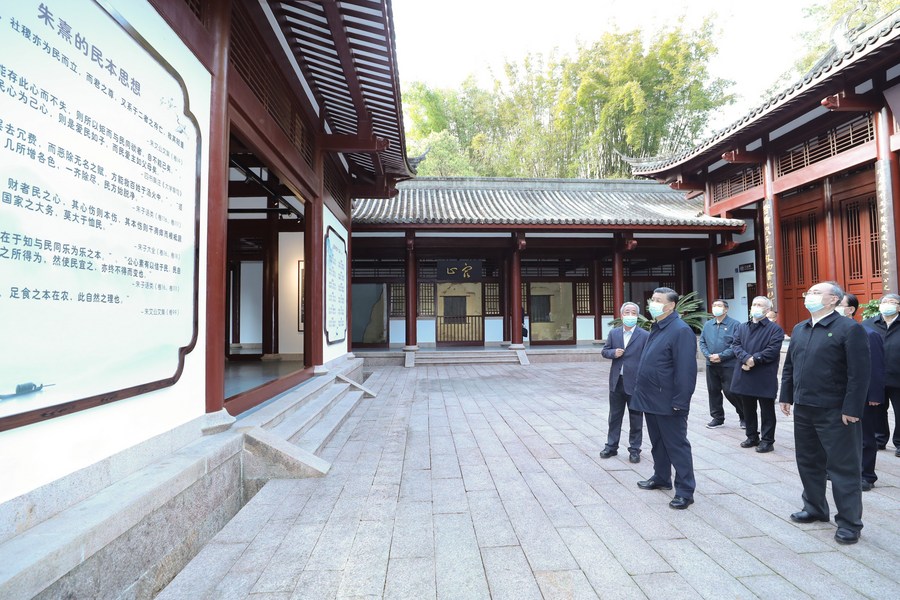
Xi Jinping visits a park dedicated to Zhu Xi, a renowned Chinese philosopher in the 12th century, in Nanping, Fujian Province, March 22, 2021. (Xinhua/Ju Peng)
NEW MODEL OF CIVILIZATION
“Our understanding of time is measured in centuries or millennia,” Xi said.
He draws strength from history and China’s fine traditional culture to govern China and lead the country toward modernization.
“History should not encumber memory. It should enlighten common sense,” Xi once quoted German writer Gotthold Ephraim Lessing.
An avid reader of history books from a young age, Xi told officials to have a “historical perspective” when they think and make decisions.
Xi praised China’s fine traditional culture as the “root and soul” of the Chinese nation.
Ahead of the 20th CPC National Congress, writing a foreword to the Revitalization Library, a book series themed on China’s national revival, Xi once again highlighted the significance of documenting historical records.
Xi has stressed confidence in four spheres: in the path, theory, system and culture of socialism with Chinese characteristics. Among the four, confidence in one’s culture is a broader, deeper and more fundamental form of self-confidence, he said.
Xi has visited numerous cultural sites in the past decade. Without the 5,000 years of Chinese civilization, there would be no Chinese characteristics; without Chinese characteristics, there would be no such success as the path of socialism with Chinese characteristics, he said.
Xi champions the exchanges and interactions between civilizations to debunk the “clash of civilizations,” and stressed carrying forward the shared values of humanity that Chinese civilization epitomizes. “Mutual respect, solidarity and harmonious coexistence are the right path for the development of human civilization,” he noted.
“China is not just a nation state, it is a civilization state. And if you don’t understand that, I don’t think you really understand anything about China,” said British scholar and political commentator Martin Jacques.
Xi is leading China on a uniquely Chinese path to modernization, which analysts say, is creating a new model for human civilization. According to Xi, China’s modernization must cover a massive population, lead to common prosperity, deliver material, cultural and ethical progress, promote harmony between humanity and nature, and proceed along a path of peaceful development. China’s modernization not only has the common characteristics of modernization in other countries, but also has Chinese characteristics based on national conditions.
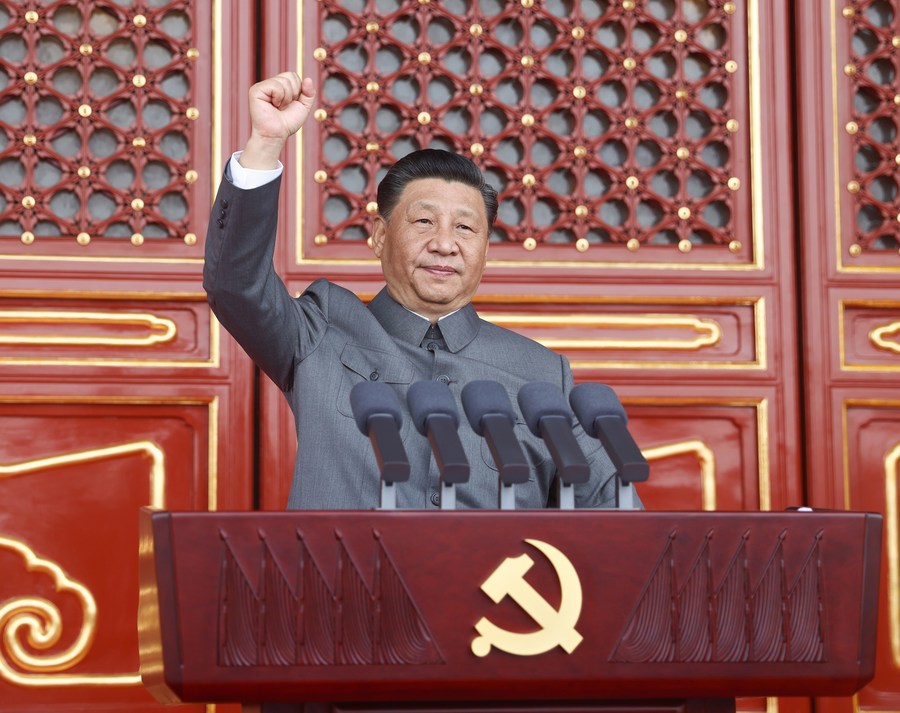
Xi Jinping delivers an important speech at a ceremony marking the 100th anniversary of the founding of the CPC in Beijing, July 1, 2021. (Xinhua/Ju Peng)
In pursuing a CPC-led socialist modernization, Xi said, “we must neither retrace our steps to the rigidity and isolation of the past, nor take the wrong turn by changing our nature and abandoning our system.”
“We must stress reliance on our own efforts to drive the nation’s development, and make sure the future of China’s development and progress remains firmly in our own hands,” he said.
By 2035, China will have basically achieved modernization. This will mark the first time in human history that an entire population of over 1 billion people achieve modernization as a whole. The great achievements China has made in the process of world modernization represent the greatest contribution made by the CPC to the cause of human progress.
By then, China’s per capita GDP will reach the level of moderately developed countries and the size of the middle-income group will be significantly expanded. China will be a global leader in innovation, and its carbon dioxide emissions will steadily decline after reaching the peak. China’s high-speed railway system, already the world’s largest, will almost be doubled in total length.
China’s path to modernization is not only a source of pride for the Chinese people, but also offers a new option for nations who want to accelerate development while preserving their independence.
Humphrey Moshi, director of the Center for Chinese Studies at the University of Dar es Salaam of Tanzania, said China’s development story has shown that poverty and backwardness can be overcome, and with the right path, African countries can also achieve prosperity and development.
The success story of China, a success achieved by adapting the basic tenets of Marxism to China’s specific realities and its fine traditional culture, is also a story of the revival of socialism. More than 500 years after its birth, socialism has survived and thrived despite setbacks and the noise of naysayers, revitalized by the Chinese Communists in the new era.
A new journey has begun. Xi will lead China to pursue national rejuvenation by following the uniquely Chinese path to modernization, and to continue striving for a shared future for humanity.
When meeting the press on Sunday, Xi said that Chinese modernization is a great yet enormous undertaking. The enormity of the task is what makes it great and infinitely glorious.
“The journey ahead is long and arduous, but with determined steps, we will reach our destination,” Xi said.



